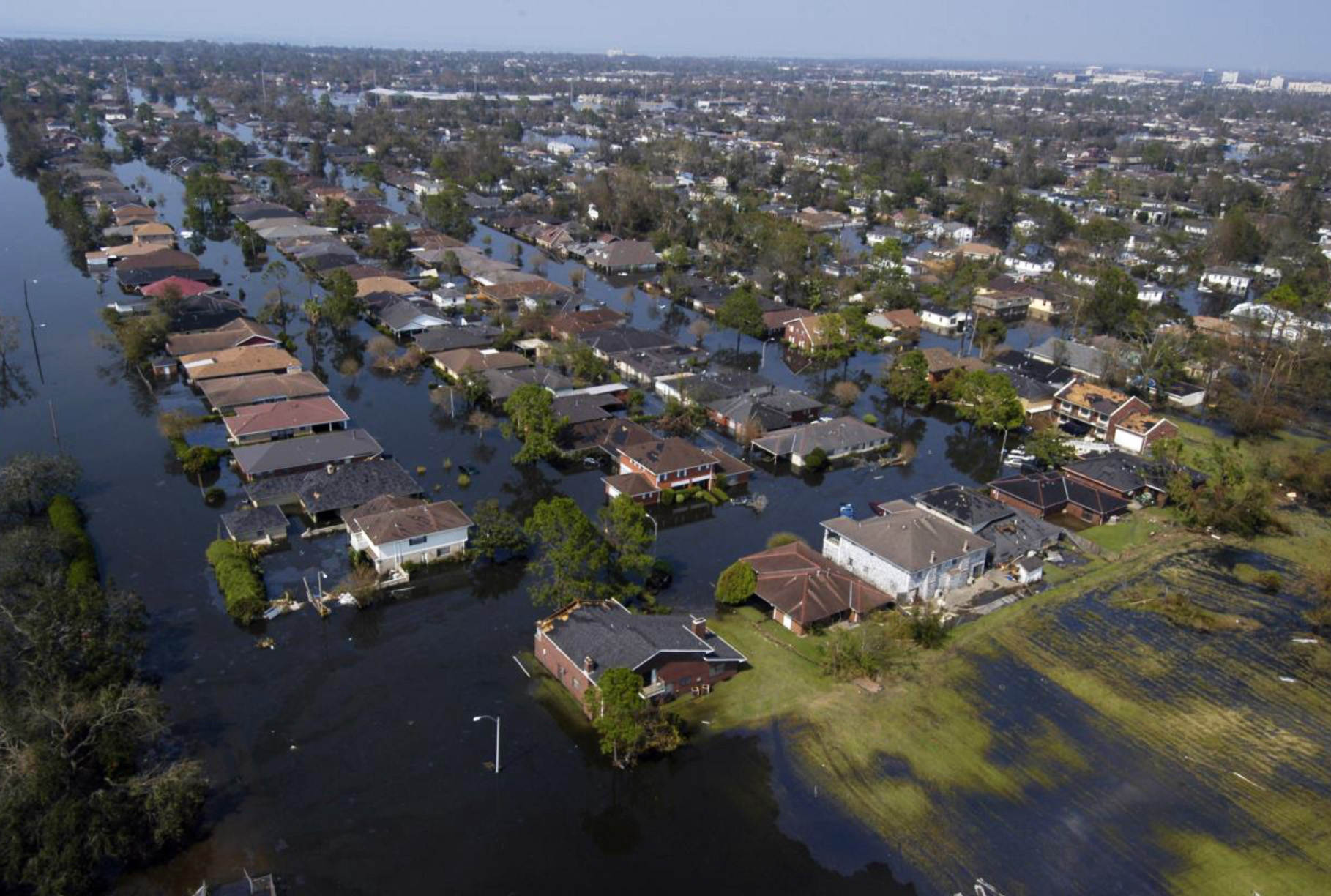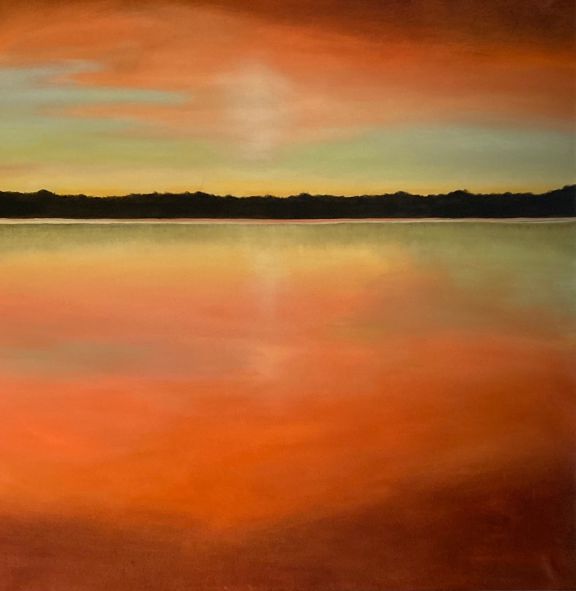Our thoughts and prayers are with the people of Texas as they endure nothing short of a disaster. The tragic events unfolding in towns and cities across the coast of Texas as a result of Hurricane Harvey are a painful reminder of the devastation reeked on New Orleans and the Mississippi Gulf Coast in 2005 by Hurricane Katrina.
Our thanks to Carla Carlisle for allowing Porchscene to reprint this article on the anniversary of Katrina in August of 2015 and again this week.

Laissez les bon temps rouler
New Orleans was our spiritual watering hole
Whenever I have a case of the blues, or even full blown melancholy, I take a ham hock and a pound of spicy smoked sausage out of the freezer and put two cups of red beans in a pan to soak. Thawing and soaking take eight hours, cooking another two, but the red beans and rice provide comfort which passes all understanding.
Red beans and rice is part of my culture. It’s also part of the culture of New Orleans, our ‘big town,’ my family’s escape hatch, our spiritual watering hole: a hundred mile journey that delivered Mississippians out of their ‘dry’ state where the sale of alcohol was still prohibited, to the amphibious city, where liquor flowed freely and the motto was laissez les bon temps rouler. (Let the good times roll). Last October I bought 10 lbs. of the red beans from the French Market and a dozen small bags of filé, the powdered dried leaves of the sassafras tree used to flavour and thicken my other edible cure, seafood gumbo.
Today while the red beans soak, I listen to the radio, read the papers, follow the news online and press the redial button. For three days my calls have been answered with a recording: ‘All telephone lines are down. Please try later.’ Last night news as tangled as the mimosa and bougainvillea of the steamy grotto gardens of New Orleans itself, began to emerge via emails: my cousin Jamie, whose flat is on Conti Street in the French Quarter was safe out in California; cousin Steve’s house between Gulfport and Biloxi is damaged, but still standing. His family fled in their camper van, and are now living in Aunt Ruby and Aunt Edna’s front drive. English friends, whose daughter, Catherine, teaches at Tulane University, report that she stayed in New Orleans until Tuesday night because she didn’t want to leave her two dogs. Finally friends drove her and the dogs to Baton Rouge, picking up another distressed dog on the way. Alive. Safe.
Every few hours I go to www.nola.com to read the New Orleans Times-Picayune, the city’s newspaper whose presses are all underwater. They are publishing online and the first article I read began: ‘No one can say they didn’t see it coming…’ That rings true. Last October, sitting in the Café du Monde eating beignets and drinking the chicory-flavoured coffee, I read excerpts from a report issued in 2001 by the Federal Emergency Management Agency warning that a hurricane striking New Orleans was one of the three most likely disasters in the U.S. (The other was a terrorist attack on New York City. I’ve forgotten the third.) But by 2003, the federal funding for flood control was diverted to the war in Iraq. In 2004, the Bush administration cut by more than 80% the funding requested by the Army Corps of Engineers for holding back the waters of Lake Ponchetrain. Meanwhile developers were being permitted to destroy wetlands and barrier islands that surround New Orleans, areas that historically have held back the surge of hurricanes.
But if a storm as Biblical in its fury as Hurricane Katrina was predictable, who could have predicted the panic, suffering and desperation, the fatal delay in establishing order, organizing shelter, food, drinking water, tents, lights, sanitation, the descent into violence and anarchy?
No one now remembers the Great Mississippi Flood of 1927, when a million people lost their homes and black sharecroppers were forced to spend months on top of a levee without adequate food, shelter or medical care. My grandfather, a Delta planter, saw the ’27 flood as a parable of ineptitude, greed and the all-encompassing arrogance of the men in power. He believed that natural disasters expose man-made injustices, wash away the foundations of one society and plant the roots of another. The world is now witness to a powerful country’s long-hidden darkness and despair, to the limits of power. They say that after this, New Orleans will never be the same. I don’t believe that America will ever be the same.
Carla Carlisle 09/02/2005

Carla Carlisle was born on the banks of the Yazoo River in Greenwood, Mississippi. Her childhood was divided between two farms: her maternal grandparents’ dairy farm in the red clay hills and her paternal grandparents’ cotton plantation in the Mississippi Delta. She dreamed of a world of paved sidewalks, and succeeded in living in New York, Paris and London before marrying Sir Kenneth Carlisle, Suffolk farmer and Tory Member of Parliament, with a thousand acres of arable land in the east of England. Within three years she had planted a vineyard, converted a 400-year old barn into a vineyard restaurant, produced a son and turned an ancient Suffolk estate into a hotbed of defiant utopianism. For twelve years she also wrote a weekly column for that most English institution COUNTRY LIFE. This piece appeared the week after Katrina.
Photo of people stranded is licensed under CC By 4.0 — linked to Google Images, File:Katrina-14512.jpg – commons.wikimedia.org
Photo of flood is licensed under CC By 4.0 — linked to Google Images, New Orleans after Katrina, credit: Jocelyn Augustino –FEMA
Photo of flooded New Orleans is licensed under CC By 4.0 — linked to Google Images commons.wikimedia.org3008 × 2000Search by image
File:US Navy 050902-N-5328N-582 Four days after Hurricane Katrina



Thank you Deborah for sharing Carla’s article. I always enjoy reading anything Carla writes. I was blessed to know Carla during elementary and high school years in Mississippi. She always had a special talent for writing and I am blessed to have called her a friend.
We now seem to be entering an age of refugees and immigrants seeking sanctuary all around the globe. And this tide of humanity seems to be blocked by even greater walls of man’s inhumanity to man. Let the next rain showers remind us all,,,, that the angels weep.
She who can speak knowledgably, and with heart-beat, about red beans and rice, New Orleans, the flood of ’27, Katrina, Greenwood and Suffolk County is a special kind of lady ….. thanks, Carla !
I will read anything Carla Carlisle writes.
Thank you, Deborah.
Thank you, Carla.
Thank YOU Randall!